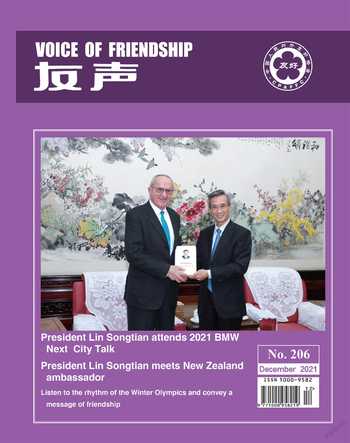Understanding and mutual respect,basis of people-to-people friendship
2021-01-22KurtKarst
Kurt Karst
K nowledge, understanding and respect for other cultures is crucial to people-to-people friendship. This principle is universally applicable and essential for world peace.
The years 2021 and 2022 are important moments in the history of Germany-China relations. This year marks the centennial of the Communist Party of China, and next year we will celebrate the 50th anniversary of the establishment of diplomatic relations between Germany and China.
My own relationship with China began in 1993 with the Villa Musica, a state foundation in RhinelandPalatinate, Germany. The foundation has many tasks, including the mission of maintaining international exchanges. At that time, to enhance exchanges in the international music sector, I began to promote Villa Musica’s contact with traditional Chinese music as the foundation’s general director. In 1993, the first Chinese music group came to Rheinland-Pfalz and toured many German cities. It was well received by audiences.
In 1995, Villa Musica began cooperation with the Chinese People’s Association for Friendship with Foreign Countries, and I visited Beijing for the first time. Since then, we have invited a Chinese traditional music group to Germany every year and sent a European classical music group to perform in China in the following year. Such cultural exchanges are important and necessary for people to understand each other’s cultures objectively.
Over the years, I have hosted many Chinese music groups and friends in Germany. I have also traveled to many provinces and cities in China.
China has become a tourist destination of particular interest to many Germans. We have seen the beauty of its mountains and rivers, the hospitality of its people and the richness of its culture. Another thing that has struck me during my many visits is the colorful culture of its 55 ethnic minorities.
Since my first visit to China in 1995, the country has really changed a lot. It’s incredible how fast the change has been. Following are a few simple examples:
In 1995, the streets of downtown Beijing were flooded with about a million bicycles. There are millions of cars today.
It used to be difficult for foreigners to get around on public transportation in China if they didn’t know Chinese characters. During the 2008 Olympics, English was added to street signs and foreigners could travel easily in China without help from others.
China is also leading the world in electronics and artificial intelligence.
None of these achievements could have been made without the contributions of the CPC. I wish to extend heartfelt congratulations to the CPC on its centennial!
The reform and opening-up initiated by Deng Xiaoping in 1978 has greatly improved the living standards of the Chinese people and created conditions for the complete success of poverty alleviation.
What about the relationship between Germany and China since 1972? Globalization has brought the two economies closer to each other and afforded mutual benefits. Even during the COVID-19 pandemic, bilateral relations have grown, virtually unscathed. However, cultural exchanges between the two sides have been affected. Many scheduled performances and visits by Chinese music groups had to be shelved, and many had to be conducted online.
We signed a cooperation agreement with the CPAFFC in 2018. I believe it is important to continue our cooperation within the framework of the agreement. I often happily recall co-organizing “Meet China” with the CPAFFC in Trier, Germany, on the occasion of the 200th anniversary of the birth of Karl Marx.
We hope that mankind can overcome the pandemic as soon as possible. Face-to-face exchanges will be resumed in the near future and cultural exchanges between Germany and China will continue to be deepened. As I said in the beginning, knowledge, understanding and respect for other cultures is crucial to people-to-people friendship.
We live in the same global village!
(The author is chairman of the Arbeitsgemeinschaft Deutscher ChinaGesellschaften. His Chinese friends affectionately call him “Lao Ka”.)
杂志排行
Voice Of Friendship的其它文章
- The Seagulls of Salt Lake City:Helen Foster Snow and China
- Overseas students from Peking University visit Xinjiang
- Listen to the rhythm of the Winter Olympics and convey a message of friendship
- A review of exchanges between Baoji and ROK in 2021
- 2021 GD Youth Link:3rd Guangdong International Youth Sports Dialogue held in Guangzhou
- Pacific China Friendship Association members issue joint statement to the WHO opposing politicization and stigmatization in COVID-19 origin-tracing
